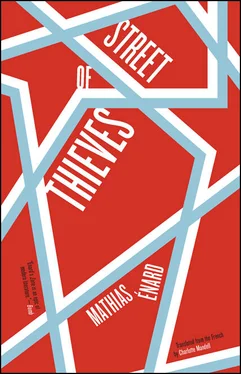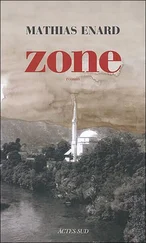Mr. Bourrelier was nice enough to me; he often said to me Ah, sorry, still no thrillers on the horizon, but if there ever are any, I swear they’ll be yours. I was a good worker, I think, I tried to be serious and didn’t have much else to do.
One day, my zeal got me a poisoned gift: when I arrived at work one morning, Mr. Bourrelier called me into his office. He was cheerful, he was laughing like a child, I’ve just gotten some excellent news, he told me. Magnificent news. A very big order from the Ministry of Former Combatants. It involves digitalizing the individual files of all combatants in the First World War. It’s a very fat contract. We replied to their call for bids, and we were chosen. They’re handwritten files, impossible to deal with them automatically, we’ll have to copy them out by hand. We’re beginning with the dead.
“Aren’t they all dead yet?” I asked naively.
“Yes yes, of course they’re all dead, there aren’t any more French fighters from the First World War alive. I mean we’re going to begin with the ‘Dead for France,’ a separate batch of files.”
“And how many are there?”
“One million three hundred thousand files, total. Then there’re the wounded and the ones who got out alive, that’ll be more cheerful.”
One million three hundred fucking thousand dead, you don’t really realize what that represents, but I can assure you that makes quite a bit of work for typing by the kilometer. Gigabytes and gigabytes of scanned files, a special program to enter the data, last name, first name, date and place of birth, serial number, date, place, and type of death, sic, type of death, they didn’t weigh themselves down with fancy phrases, at the time, do you think, they had hundreds of thousands of files to fill out. All of it handwritten, in a beautiful fountain-pen calligraphy: Achille Brun, soldier, 138 thInfantry Division, Died for France on December 3, 1914, in the hospital at Châlons-sur-Marne, Type of death: war wound (crossed out) typhoid fever (added), born January 25, 1891, in Montbron in Charente; Ben Moulloub, Belkacem ben Bohammad ben Oumar, second class, 2 ndRegiment of Algerian Infantrymen, Died for France on November 6, 1914, in Soupir, in Aisne, Type of death: killed by the enemy, born in 1884 in (illegible), département of Constantine, and so on a million three hundred thousand times, even with the special program you needed one or two minutes per file, especially to decipher the names of unknown holes in the wall, Algerian douars, Senegalese villages, French hamlets I knew nothing about; some of the soldiers stayed in my memory, like that Achille Brun or that Belkacem ben Moulloub, and it was strange to think that these ghosts of poilus were making a posthumous trip to Morocco, to Tangier, in my computer.
We divided up the work, my colleagues (French literature students or young typists, mostly) and I: one hundred fifty or two hundred files in the morning, and sixty pages of books, minimum, in the afternoon. The problem was that you couldn’t give up one project for another; everything had to be done at the same time: copying out the memoirs of Casanova for a Quebec publishing house was at least as urgent as the “Killed by the Enemy.” The volumes of History of My Life were immense, endless. I confess having taken great pleasure, despite the sleepless nights, in typing them out by the kilometer. This Casanova was funny and likeable, courtly, crafty; he spent his time running around with his sex on fire, hence on running around taking care of his venereal diseases, which didn’t seem to cause him any shame; for him, the body, women, youth had nothing shameful about them. There was an ironic intelligence in him that reminded me of Isa ibn Hisham and Abu al-Fath al-Iskandari, the heroes of Hamadani — but in a longer version, of course. The Casanova was one of the rare books I actually read as I was copying it out: over three months’ work, without any slacking.
I always wondered how much Jean-François Bourrelier billed for our services, and what his cut was; I never dared ask him. One thing was for certain, the Killed by the Enemy and Mr. Casanova didn’t touch a penny of it, and as for myself, after the accounts were audited (money withheld for corrections, etc.), I rarely managed to get more than five hundred euros a month, for a minimum of sixty hours’ work a week, which was an extraordinary salary for a young yokel like me, but far from the tens of thousands of dirhams promised. When payday arrived, Mr. Frédéric always looked slightly apologetic, he’d say Ah, there were a lot of corrections, or else Good, this month isn’t too bad, but you’ll do better next month, you have to get used to these dead-soldier files and accelerate your pace.
I told all my stories to Judit in interminable letters, that was my recreation, every night, when I should have hated the computer and above all its keyboard I would write at great length to Judit to explain what we had done that day, Casanova, the poilus and I; I told her about Achille Brun the typhoid-stricken and about Belkacem ben Moulloub dead in Soupir, about Casanova and Tireta watching an execution on the Place de Grève from a window, in the company of two ladies, without going so far as to dare tell her the obscene but hilarious details of Tireta’s mistaken shot.
I began writing her poems as well, mostly in French and stolen from Nizar Qabbani; French or Spanish poetry seemed dry to me, not flowery enough. I always ended my missives with a verse,  Love, my love, is a beautiful poem embellished on the moon, and so on. Judit was more discreet about her feelings, but I sensed, in her emails which were sometimes in French, sometimes in Arabic, that she appreciated our correspondence; she told me about her life in Barcelona, her everyday routine, her annoyance with the stupidity of her classes, her boredom at the university, where the professors themselves seemed to scorn the texts they taught as if they were a dead language like Latin. Through her, I began to hate these puny Arabic scholars in colonial shorts who every day regretted the fact that Spain had for a few centuries been Arabic, sighing over Andalusian texts in which they saw nothing but lexical difficulty. She told me look, we’re studying such-or-such a poem by Ibn Zaydún, such-or-such a fragment by Ibn Hazm whom they called Abenhazam, and I would rush to a bookstore to find the book in question; most of the time it was a wonder to me, a jewel from another time whose Arabic filled my mouth and eardrums with unprecedented pleasure. Despite the dead poilus and Casanova, I felt very Arabic thanks to Judit; I followed her studies from day to day: she would ask me grammar questions, I would open the grammar books and classical commentators to find an answer for her; she heard of an author and the next day I would send her an annotated file with extracts and summaries.
Love, my love, is a beautiful poem embellished on the moon, and so on. Judit was more discreet about her feelings, but I sensed, in her emails which were sometimes in French, sometimes in Arabic, that she appreciated our correspondence; she told me about her life in Barcelona, her everyday routine, her annoyance with the stupidity of her classes, her boredom at the university, where the professors themselves seemed to scorn the texts they taught as if they were a dead language like Latin. Through her, I began to hate these puny Arabic scholars in colonial shorts who every day regretted the fact that Spain had for a few centuries been Arabic, sighing over Andalusian texts in which they saw nothing but lexical difficulty. She told me look, we’re studying such-or-such a poem by Ibn Zaydún, such-or-such a fragment by Ibn Hazm whom they called Abenhazam, and I would rush to a bookstore to find the book in question; most of the time it was a wonder to me, a jewel from another time whose Arabic filled my mouth and eardrums with unprecedented pleasure. Despite the dead poilus and Casanova, I felt very Arabic thanks to Judit; I followed her studies from day to day: she would ask me grammar questions, I would open the grammar books and classical commentators to find an answer for her; she heard of an author and the next day I would send her an annotated file with extracts and summaries.
Of course, these activities were incompatible with my co-renters’ way of life, who had been unearthed by a kind of syndicate of French companies, which tried as much as possible to facilitate lodging for their personnel; Adel, Yacine, and Walid all came from Casablanca, they were “skilled technicians” and worked in an automobile parts factory, on the assembly line. Every night they saw me immersed in my files of dead soldiers or in my books, and took me for a madman. Sometimes they’d shout Lakhdar khouya, you’re going to make yourself deaf and blind, it’s worse than masturbation, all that, come out for a spin in the open air, you’ll see some girls! No no, he’ll just see the sea, but that can’t hurt him! Moulay Lakhdar, you’re pale as prepubescent underwear, come inhale the exhaust from our car! And they’d end up leaving, earpiece in place, for Tangier and its delights, cruising with the music at full blast for hours till they ended up stuffing their faces with hamburgers around midnight, coming home brimming with excitement, and sprawling in front of the TV smoking joint after joint before returning to the factory the next day.
Читать дальше

 Love, my love, is a beautiful poem embellished on the moon, and so on. Judit was more discreet about her feelings, but I sensed, in her emails which were sometimes in French, sometimes in Arabic, that she appreciated our correspondence; she told me about her life in Barcelona, her everyday routine, her annoyance with the stupidity of her classes, her boredom at the university, where the professors themselves seemed to scorn the texts they taught as if they were a dead language like Latin. Through her, I began to hate these puny Arabic scholars in colonial shorts who every day regretted the fact that Spain had for a few centuries been Arabic, sighing over Andalusian texts in which they saw nothing but lexical difficulty. She told me look, we’re studying such-or-such a poem by Ibn Zaydún, such-or-such a fragment by Ibn Hazm whom they called Abenhazam, and I would rush to a bookstore to find the book in question; most of the time it was a wonder to me, a jewel from another time whose Arabic filled my mouth and eardrums with unprecedented pleasure. Despite the dead poilus and Casanova, I felt very Arabic thanks to Judit; I followed her studies from day to day: she would ask me grammar questions, I would open the grammar books and classical commentators to find an answer for her; she heard of an author and the next day I would send her an annotated file with extracts and summaries.
Love, my love, is a beautiful poem embellished on the moon, and so on. Judit was more discreet about her feelings, but I sensed, in her emails which were sometimes in French, sometimes in Arabic, that she appreciated our correspondence; she told me about her life in Barcelona, her everyday routine, her annoyance with the stupidity of her classes, her boredom at the university, where the professors themselves seemed to scorn the texts they taught as if they were a dead language like Latin. Through her, I began to hate these puny Arabic scholars in colonial shorts who every day regretted the fact that Spain had for a few centuries been Arabic, sighing over Andalusian texts in which they saw nothing but lexical difficulty. She told me look, we’re studying such-or-such a poem by Ibn Zaydún, such-or-such a fragment by Ibn Hazm whom they called Abenhazam, and I would rush to a bookstore to find the book in question; most of the time it was a wonder to me, a jewel from another time whose Arabic filled my mouth and eardrums with unprecedented pleasure. Despite the dead poilus and Casanova, I felt very Arabic thanks to Judit; I followed her studies from day to day: she would ask me grammar questions, I would open the grammar books and classical commentators to find an answer for her; she heard of an author and the next day I would send her an annotated file with extracts and summaries.










